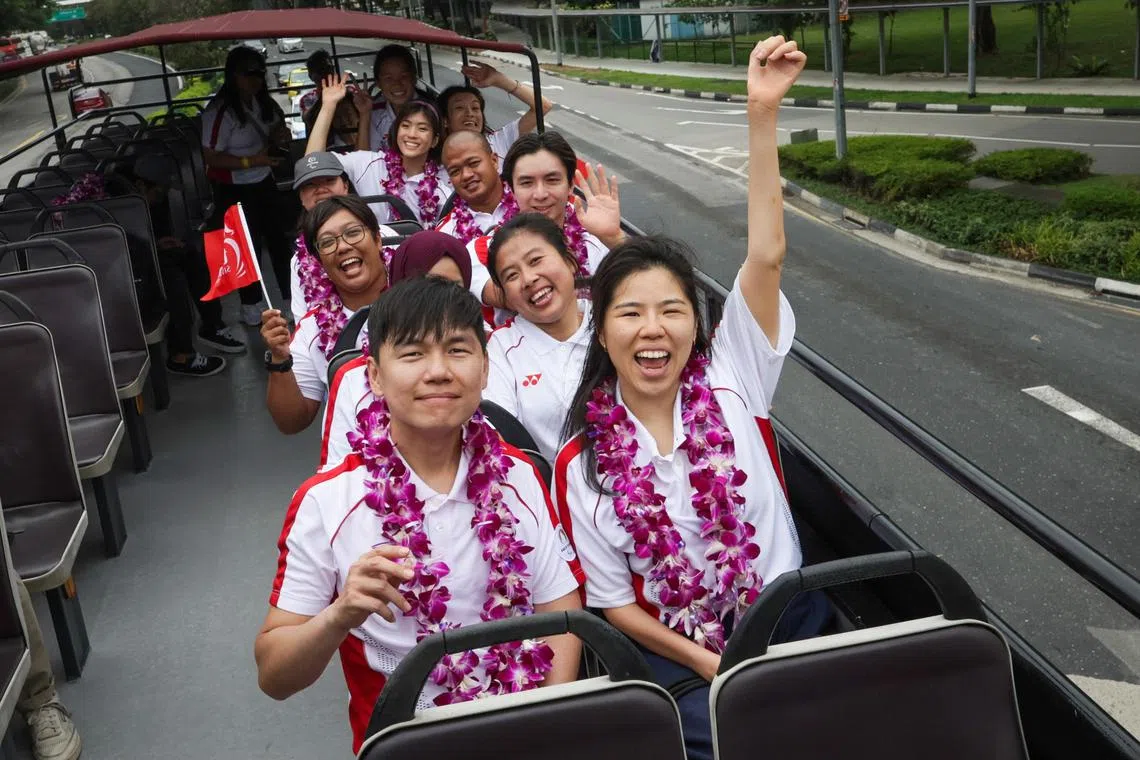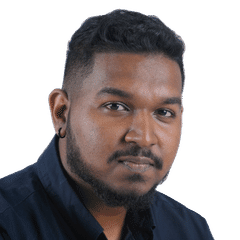Paralympians call for more empathy towards Persons with Disabilities in Singapore
Sign up now: Get the biggest sports news in your inbox

Singapore's Paralympians, including swimmer Yip Pin Xiu (front row, right), hope for greater empathy and a kinder society for Persons with Disabilities in the country.
ST PHOTO: GIN TAY
SINGAPORE – Even as Singapore’s Paralympic heroes lapped up the cheers and support of their fans during the open-top bus parade on Sept 14, they also wanted to deliver a strong message to the nation.
Life in Singapore as a person with disabilities (PWDs) is not as smooth sailing as their bus riding through the city,
While appreciative of the support they have received in their sporting careers, both athletes said they have faced discrimination.
Yip, 32, was born with Charcot-Marie-Tooth disease, which causes the progressive loss of muscle tissue and touch. She has used a wheelchair since her early teens.
She shared that she has had irritable Grab drivers complaining about having to help with her wheelchair, and bus drivers showing frustration when setting up ramps.
She said: “Sometimes people here may not be very nice. When you face this kind of things once, you don’t really want to do it again, then you get very discouraged from leaving the house. Even I face all this, so I cannot imagine what else others face. It would be even tougher for them. Society here still needs to be kinder and a lot more empathetic.”
Soon, 27, was diagnosed with cone-rod dystrophy as a child, a condition which causes deteriorating vision.
She relies on her guide dog, Orinda,
While bus drivers have been kind – helping her with bus numbers and finding her a seat – she overhears complaints from passengers about her dog’s presence “seven out of 10 times” when taking the bus.
She said: “I feel that hasn’t changed very much, especially in the restaurant scene. Sometimes, out of pure exhaustion of not wanting to argue and make a stand, I just opt to leave Orinda at home. I don’t think that should be the way that a guide-dog user should live their life. Ground staff still lack the awareness of this issue.”
Since launching its first Enabling Masterplan in 2007, Singapore has made strides in supporting PWDs, improving education, sports participation, assistive technologies and accessible infrastructure. The Enabling Masterplan 2030 – a vision for a more caring and inclusive Singapore – was released two years ago to cover areas such as education, employment, independent living and access to digital services.
However, the real challenge lies in societal attitudes.
Yip said: “It is not just about what the Government can do, but also what the corporates and what Singaporeans can do. Everybody really needs to work together to create a more inclusive society.”
Both Yip and Soon have seen more inclusive communities abroad. When Soon visited Melbourne in 2022, she felt “the most human I felt in a very long time”, noting that no one questioned the presence of her guide dog or treated her differently. Getting into restaurants was a breeze, she added.
Noting her experience in Europe, Yip said: “People with disabilities are more visible in the community, doing the same things as able-bodied people. It’s crucial for PWDs to be part of the social fabric.”
Equestrienne Laurentia Tan, who has cerebral palsy and profound deafness and has lived in Britain since she was five, echoed this sentiment.
Her family moved to England for Tan to have a more conducive environment to live, work and play in, and she recalled being stared at when visiting Singapore as a child.
While she acknowledges improvements in accessibility here, she believes there are still gaps, particularly in attitudes towards hidden disabilities. The 45-year-old said: “In the UK, people focus on what you can do, not what you can’t. I was fortunate to have teachers and friends who included me in everything.”
More education to foster understanding and empathy towards PWDs is needed, said Tan and para-shooter Daniel Chan. Tan said that the language and attitudes towards PWDs need to be more compassionate, while the latter called for greater exposure and engagement with PWDs from a young age.
Chan, who has Erb’s palsy – a condition resulting from a traumatic birth delivery which damaged the nerves in his left arm – said sharing the Paralympians’ stories would help people relate to their experiences.
“There’s a lot of uncertainty about how to approach PWDs,” he said.
“That comes from a lack of education and exposure. We need more awareness programmes to bridge that gap, so people can better relate and support our journeys.”



